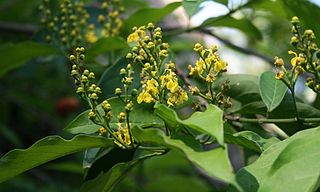
August Heinrich Rudolf Grisebach was a German botanist and phytogeographer. He was born in Hannover on 17 April 1814 and died in Göttingen on 9 May 1879.

Malpighiaceae is a family of flowering plants in the order Malpighiales. It comprises about 73 genera and 1315 species, all of which are native to the tropics and subtropics. About 80% of the genera and 90% of the species occur in the New World and the rest in the Old World.
Alicia is a genus in the Malpighiaceae, a family of about 75 genera of flowering plants in the order Malpighiales. Alicia comprises 2 species of woody vines widespread in South America.

Franz Josef Niedenzu was a German botanist born in Köppernig. He is remembered for his work with the botanical family Malpighiaceae.
Malpighiodes is a genus in the Malpighiaceae, a family of about 75 genera of flowering plants in the order Malpighiales. Malpighiodes comprises 4 species of woody vines native to northern South America.

Hiptage is a genus in the Malpighiaceae, a family of about 75 genera of flowering plants in the order Malpighiales. Hiptage comprises 30 species of vines and woody shrubs growing in forests of tropical southeastern Asia from Pakistan and India to Taiwan, the Philippines, and Indonesia. The genus is distinctive in its three-winged samaras; most species bear an elongated commissural gland on the calyx.

Galphimia is a genus in the Malpighiaceae, a family of about 75 genera of flowering plants in the order Malpighiales; the name is an anagram of Malpighia.Galphimia comprises 26 species of large herbs, shrubs, and treelets. Twenty-two species occur in Mexico, one extending into Texas and one ranging to Nicaragua; four species occur in South America, south of the Amazon Basin. Galphimia gracilis is widely cultivated in warm regions throughout the world. Eight species are distinctive in that the petals become stiff and papery, and persist past the stage of fruit maturation.

Bunchosia is a genus in the Malpighiaceae, a family of about 75 genera of flowering plants in the order Malpighiales. It contains roughly 75 species of trees and shrubs, which are native to dry woodlands, savannas, and wet forests. Their range extends from Mexico and the Caribbean to southeastern Brazil and adjacent Argentina. Bunchosia is one of three arborescent genera of Malpighiaceae with fleshy, bird-dispersed fruits.

Mascagnia is a genus in the Malpighiaceae, a family of about 75 genera of flowering plants in the order Malpighiales. The genus Mascagnia comprises about 45 species that occur in diverse habitats from northern Mexico and the Caribbean to northern Argentina and south-eastern Brazil.
Mezia tomentosa is a species of plant in the Malpighiaceae family. It is endemic to Ecuador. Its natural habitat is subtropical or tropical moist lowland forests.
Spachea is a genus in the Malpighiaceae, a family of about 75 genera of flowering plants in the order Malpighiales. Spachea comprises 6 species of shrubs and trees growing in wet forests. One species occurs in Cuba, 2 species in southern Central America with one of those also in adjacent Colombia, and 3 species in northern South America. Spachea correae, native to Costa Rica and Panama, is listed in the IUCN Red List of Threatened Species.

Stigmaphyllon is a genus in the Malpighiaceae, a family of about 75 genera of flowering plants in the order Malpighiales. Amazonvine is a common name for species in this genus.
Coleostachys is a genus in the Malpighiaceae, a family of about 75 genera of flowering plants in the order Malpighiales. Coleostachys contains only one species of shrubs or treelets found in wet forests of the Amazonian lowlands of French Guiana and adjacent Brazil.
Ectopopterys is a genus in the Malpighiaceae, a family of about 75 genera of flowering plants in the order Malpighiales. Ectopopterys contains only one species of woody vines native to lowland wet forests of Colombia, Ecuador, and Peru.
Blepharandra is a genus in the Malpighiaceae, a family of about 75 genera of flowering plants in the order Malpighiales. Blepharandra comprises 6 species of trees and shrubs native to sandy savannas and scrub forests of Guyana, southern Venezuela, and Amazonian Brazil.

Carl Christian Mez was a German botanist and university professor. He is denoted by the author abbreviation Mez when citing a botanical name.

Callaeum is a genus in the Malpighiaceae, a family of about 75 genera of flowering plants in the order Malpighiales. Callaeum comprises 11 species of woody vines and shrubs occurring from western Texas to Mexico, Central America, and South America. Two species, C. macropterum and C. septentrionale are cultivated as ornamentals in Arizona and California.
Christianella is a genus in the Malpighiaceae, a family of about 75 genera of flowering plants in the order Malpighiales. Christianella comprises 5 species of woody vines and shrubby habit occurring in forests, roadside thickets, and shrubby savannas in southeastern Mexico, Central America, and South America.

Aspidopterys is a genus of Malpighiaceae, a family of about 75 genera of flowering plants in the order Malpighiales. Aspidopterys comprises approximately 15 species of vine native to Asia.
Madagasikaria is a genus in the Malpighiaceae, a family of about 75 genera of flowering plants in the order Malpighiales. Madagasikaria contains only one species of woody vines native to deciduous seasonally dry forest of Madagascar.











